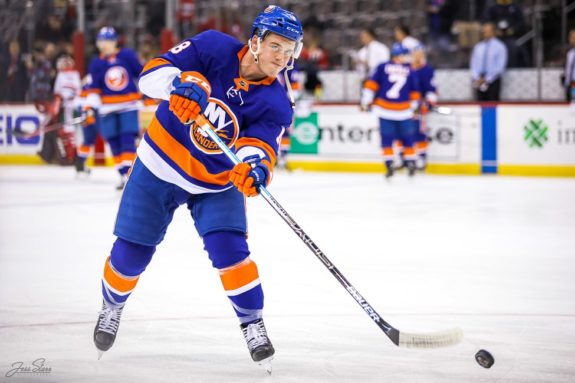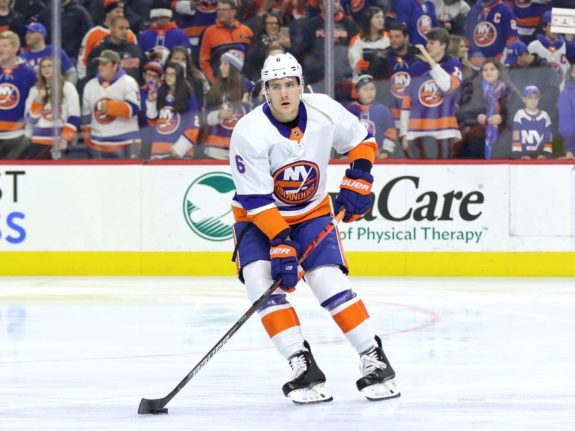The New York Islanders split the first two games of the semifinal on the road against the Tampa Bay Lightning with a 2-1 Game 1 win followed by a 4-2 Game 2 defeat. The result of the first two games can be regarded as a victory as the Islanders stole a game on the road and head back to Nassau Coliseum with the ability to take control of the series. The first two games also reminded both teams how they will ultimately win this series and who needs to step up in the upcoming games in order to advance to the Stanley Cup Final. Additionally, the games exposed weaknesses in the Lightning and how they can be defeated in the next two games.
Anthony Beauvillier
In the first round, it looked like Anthony Beauvillier was going to play a major role in the Islanders’ playoff success, as the young forward constantly crashed the net and created scoring opportunities in the later lines. His speed allowed him to outskate the defense on the wings, and lead or often be the recipient of an opportunity following an odd-man rush, leading to three goals against the Pittsburgh Penguins in the first-round series. Unfortunately, since Game 1 of the second round, the 24-year-old forward has failed to find the back of the net and hasn’t been much of a factor for the Islanders’ offense.

The Islanders need plenty of skaters in the later lines to step up in the upcoming games. Beauvillier, however, can be a significant scorer in this series in large part because of the speed he possesses on the wings and on odd-man rushes. Mathew Barzal’s goal in Game 2 showed the offense how they can attack Andrei Vasilevskiy, who rarely allows the puck to slip past him, as Jordan Eberle crashed the net from the wing and shot the puck off Vasilevskiy’s pads, allowing Barzal to find the puck right in front of the net. Beauvillier can lead rushes from the neutral zone and if the Lightning defensemen allow him to skate along the boards, he can fire low shots on the net, leading to a handful of goals or second-chance opportunities.
The Defensemen Must Handle Lightning Pressure
In the Game 2 defeat, the Islanders’ defensemen allowed costly turnovers in the defensive zone, resulting in easy goals for their opponent and the primary reason for the lopsided loss. Like the Bruins offense, the Lightning tend to pressure their opponents with the forecheck and force mistakes in the offensive zone to set up their potent offense. For the Islanders, it must be a priority after creating a turnover to avoid handing over the puck in the defensive zone to their opponent and furthermore, establishing an offensive presence following the turnover rather than simply clearing the puck past the blue line.

The Islanders have benefited throughout the regular season from their defensive pairings that play great on both ends of the ice. Whether it’s Adam Pelech eliminating a skater in the defensive zone or Ryan Pulock firing a slapshot from the point on the offensive end of the ice, the defensive unit has led the team to the Stanley Cup Semifinal and will be one of the major factors in the continued playoff success. In this series, the Lightning will continue to play aggressively in the offensive zone and the errors will be consequential as the series develops, making it a priority for the Islanders defensemen to continue to create turnovers, but also start up the offense with an effective transition.
Pageau-Led Line Needs to Step Up
Jean-Gabriel Pageau and Kyle Palmieri have formed a formidable duo in the Stanley Cup Playoffs on the same line, providing goals on the back end of the forward unit and helping the Islanders overwhelm their opponents. The duo combined for 10 goals and 11 assists in the first two rounds, but have been eliminated by the Lightning defense almost entirely in the first two games of the semifinal series with the defensemen attacking them in the neutral zone and forcing difficult shots in the offensive zone on the goal. The later line must start attacking the net and likewise, create scoring opportunities if the Islanders are going to control the series.
While Palmieri and Pageau have been playing great on both ends of the ice, Travis Zajac continues to struggle for the shift, only scoring one goal in the playoffs and failing to help create on the offensive end of the ice. It’s possible that a line change might be necessary for Game 3 and for the remainder of the series, but head coach Barry Trotz won’t want to sacrifice the success of the other lines in the process. The hope is that Oliver Wahlstrom, who missed the entire second round with an injury, can return to the lineup in the upcoming games, but the 20-year-old forward will also have to acclimate himself to the playoffs and, most notably, the strong Lightning defense.
Other Aspects of the Game the Islanders Must Consider
In the first two games, the Islanders and Lightning force their opponents to chip and chase and made puck movement difficult as they were able to level their opponents and remove them from the puck with hard hits in the neutral zone and along the boards. This style of play falls into the Islanders’ favor as they benefit from a slower game with less puck movement.
Latest Islanders Content:
- New York Islanders Should Target Free Agent Alex Nylander
- A Hockey Fan’s Travel Guide to New York City
- 4 Things Patrick Roy Can Learn From Jon Cooper & Mike Sullivan
- Simon Holmstrom’s Fit on the Islanders is Unclear
- The Boss of Long Island: Mike Bossy’s Life Story
The issue that might arise is the power play, particularly if the Lightning receive more opportunities, which they have taken advantage of more than any team in the Stanley Cup Playoffs, scoring 17 power-play goals including two in the semifinal already. The hard hits and tough overall play tend to lead to more penalties and this series has already seen the consequences. For a Trotz-coached team, it will be crucial to find that balance with every detail playing a major role in deciding which team will ultimately advance to the Stanley Cup Final.